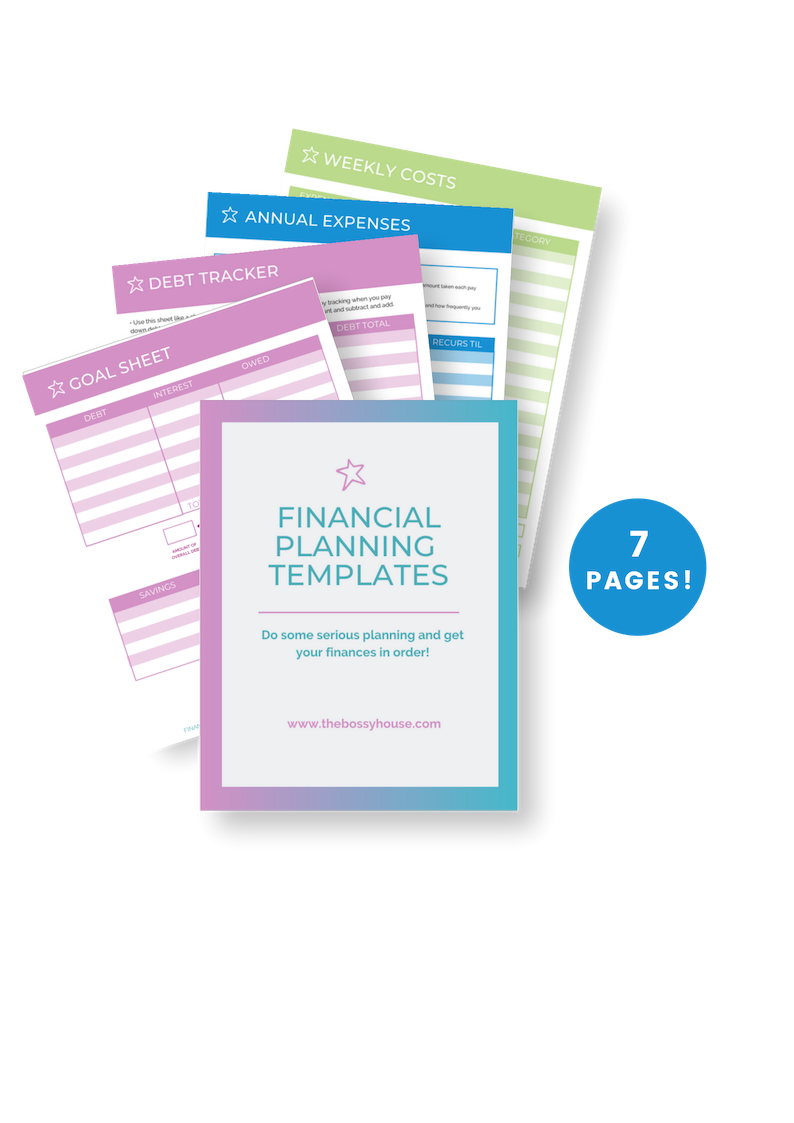
If you’re in dire need of financial organization, I’m so glad you’re here. We're talking about the hidden costs of disorganization in your finances.
You might be thinking to yourself, “I’m not in too bad of shape. I’m not broke anymore-- is my lack of a system that big of a deal?
Wellllll, let’s talk about it!
I help women take charge of their finances by creating a system. SYSTEMS are what I believe can keep you on track and help you meet your financial goals.
How do you know if your lack of organization is costing you money?
Hidden Costs of Disorganization: Examine your systems
What systems do you have in place for managing your money? If you're thinking "um... what systems?" then you probably need to read this whole post, watch a few of The Bossy House videos, download the templates, and get to planning!
There are dozens of possible systems you COULD put in place to counteract the hidden costs of disorganization.
Here are questions to ask yourself about your systems:
If you don't have any of these questions easily answered, time to put some systems in place!
If your systems are broken, what are the hidden costs of disorganization?

You might not FEEL the effects of not having a system. It might not be that big of a deal to you since you can afford your life…
But where’s the hidden cost?
The hidden costs of disorganization are late fees, overdraft fees, lots of mystery charges in your bank account, and penalties for accounts being cancelled.
Sometimes you miss the notices from your insurance company, and your policy gets cancelled--with a hefty cost to sign back up (this happened to me once). Sometimes you ignore parking tickets and they pile up, then get late fees on top of the parking ticket.
If you can afford the late fees, as in you don’t go broke with late fees, who cares?
Well, add those up over a year and you get hundreds of dollars you’re spending just because you don’t have a system in place.
AND the lack of a system actually takes MORE time than not having one.
So there's a FINANCIAL cost as well as a TIME and ENERGY cost. Why spend all of that just so you don't have to put a system in place?
Timing Issues Cost Money
The other issue you might be having is timing.
Are you getting surprised by big bills? You feel pretty good about yourself affording your life and then along comes the tuition bill, and (even though it’s not a surprise) it derails you for two months.
In this case, you don’t have a sense of your TRUE cost of living.

Are you doing things like shorting yourself to pay down debt and then putting important essentials on the credit card anyway because you don’t have enough spending money at the end of the month?
Leaving yourself less money in your spending account is a good idea. Not doing it the right way means you have no idea how much you need.
This is a typical timing issue. You need a system to set up your money so these timing issues don’t happen.
The long term effects of not having clear goals
Another costly mistake is not setting goals and put a dollar amount on them.
If you’re feeling great living the way you’re living without too much trouble, why bother? WELL, if you had an additional $200 a month that you’re letting slip out the door with late fees and leftover subscriptions, then you are just letting money go every month.
Add that to the dollars you’re not putting toward your goals FIRST.
Are you saying “at the end of the month if I have left over I’ll put it to savings or debt?” That means that you are probably putting FAR LESS to goals than you should be and COULD be.
You should create a system that estimates your spending and puts ALL THE REST to savings or debt FIRST.
That way, you’re guaranteed to do it, and long term it meets your goals every single month you’re working toward your goals.
Check out the free live training on tricking yourself into spending less money and get your spending under control!
My solution: get a system
First up, you’ve got to decide how much is going where every month.
You’ve got to add up your bills, figure out how much your typical cash spending each month is, and make your plan. So: calendar your bills. Decide which pay periods are going to pay each of your bills.
From there, you will have a leftover amount after your bills are paid. That is NOT SPENDING MONEY.
That is money for
Debt, Savings, Spending AND Emergencies, Big annual bills like tuition, Vacation, Christmas, Birthdays, and of course, Beyonce tickets.
So that leftover money is not left over. It has a job to do.
My system uses a ‘zero based budget,” which I like to call a down to zero budget. It helps you determine EXACTLY how much you need to afford your life, and then helps you designate it all for a purpose. Every dollar that comes into your account should have a purpose, and a SYSTEM sets that purpose up to be put on autopilot every month.
Once you have a sense of how much your bills are, now you need to figure out how much your CASH spending is each month.
This is groceries, yoga, lawn guy, lattes. Get very clear on this amount.
And If you can get a good weekly/monthly estimate of spending, you can subtract that from the leftover amount.
How much is left? If, after bills and monthly cash spending, you have $600 a month to spare, you can use that for the rest of the list.
Put a little away in an account to save for Christmas and vacation. Don’t put that on the card!
And then decide how much goes to emergency savings, and debt. Use all the rest of that money for your goals and your life.
Automation helps you avoid the hidden costs of disorganization
I automate my enter system so I never have to rely on my own memory.
So money comes into my account, then it goes automatically to everywhere else. What’s left in my spending account is for cash spending only.
This way, I don't have the option of overspending, and I've met my goals first thing after I get paid.
You can't do this system without a lot of intentional planning, but if you download my templates below you can get started with some financial planning that will help you put everything on autopilot!
Get this set of financial planning templates to get started on your budget journey!

